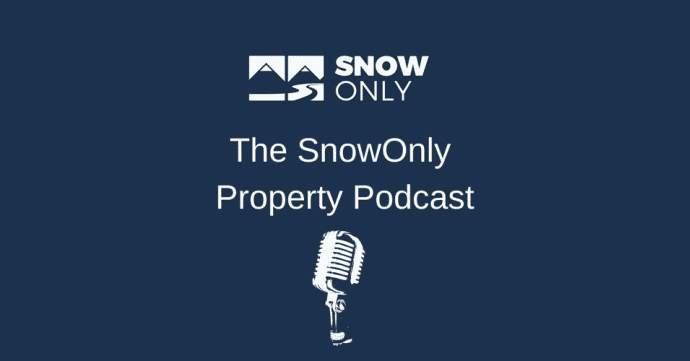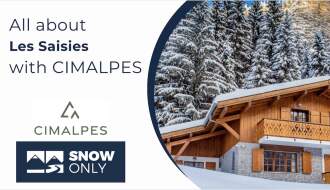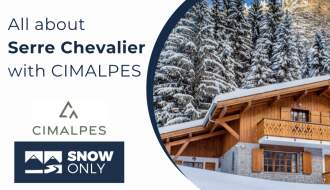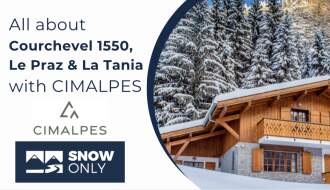Mark Lightfoot: Hi, I'm Mark Lightfoot from SnowOnly. In episode one, I'm talking to Gareth Jefferies from Alpine Property. Alpine Property has been established for over 20 years and can provide some invaluable information for anyone considering buying a ski property. Gareth talks about the current property trends in France and gives us some top tips on buying your dream ski property.
Mark Lightfoot: Hey, Gareth. Welcome to the SnowOnly property podcast episode one. Very exciting. Let's get on with some questions. First of all, can you tell me a little bit about Alpine Property? When did it start, which areas do you specialize in? Where are you at the moment?
Gareth Jefferies: We started in 1999 specializing in Morzine and the Portes du Soleil. It was a meeting between an established estate agent and the boss, Steve Norris, who knew how to build a website. And she said, “oh, I've heard about this web thing”. And he said, “oh, I could build you a website”. And that's what he did.
Mark Lightfoot: 1999. Wow, that's 22 years old now.
Gareth Jefferies: Exactly. And it was, it was easy peasy for us because we pretty much had the first website selling property certainly in Morzine and to a certain extent in the Alps.
Mark Lightfoot: Were there established real estate agents in the valley already?
Gareth Jefferies: Yes.
Mark Lightfoot: But they didn't have websites.
Gareth Jefferies: They just didn't have websites. And so, the local agencies, with the brick and mortar with the windows, they carried on working for French people who were visiting, who were on holiday, but we immediately found a British market who were starting to use the web and discover that they can browse properties online before they visited.
Mark Lightfoot: That's interesting, because I mean, we've got lots of other questions, but that's really interesting to me. So, how has that changed as we've kind of move forward or are there still agents that rely very much on walk-in traffic? I imagine everyone's got their websites now but you obviously invest money into your website to generate traffic, right?
Gareth Jefferies: Yeah. Yeah. We've been all about the web from the beginning. I got involved in the year 2000 and I've been their IT guy and then I've become their marketing guy from then. So, we've always built Alpine Property from the point of view of the internet, which certainly to start with put us at a huge advantage to the local agents. They've slowly caught up and COVID has finally pushed them over and now they've all got decent websites. But it has taken till COVID for them to finally ‘go’. Now they will take it seriously because they had no choice. They had no walking customers!
Mark Lightfoot: Yeah. Yeah. That's very true. Interesting. So, what advice would you give to someone, whether they've come through the website or into your office, what advice would you give to someone who is considering buying in the ski area in the areas that you sell? Now, obviously, you said Morzine before, but how many resorts do you specialize in now?
Gareth Jefferies: So, since then we've slowly organically grown. And we now cover the Haute-Savoie. So, that's the area which covers all the skiing within an hour or so of Geneva airport. So, Chamonix, Megeve, St Gervais, there’s the Mount Blanc area, then there’s the Aravis which is La Clusaz and the Le Grand-Bornand, that’s near Annecy. Then there’s the Grand Massif which is Samoens, Les Carroz, Flaine (not so much in Flaine). And then there’s the Portes du Soleil, which is where I live which is Les Gets, Morzine, Chatel, Saint Jean d'Aulps. And we cover also an area that's between us and Lake Geneva, Lac de Genève, it was rebranded by their tourist office. That's our thing: the ‘station de ski’: the ski areas in the Haute-Savoie.
Mark Lightfoot: Yeah, I think we'll come back to that actually: your locations in regards to obviously Geneva it makes a huge difference. So, if you had someone considering buying a ski property in the areas that you sell, what advice would you give them currently?
Gareth Jefferies: The advice has always been the same. It hasn't really changed, which is make the search of part of the pleasure. So, come out on holiday and try out a few of our areas because people always say to me, which area should I buy in? And the response is they're all great. I would live in any of them. They're all lovely. They've all got their pros and cons. And we can talk about the pros and cons if you want, but in the end, you've got to go and see which one works for you.
Mark Lightfoot: I think that's a really good point. Actually, I have the same questions, although obviously we are a platform rather than agent, we have the same questions and my response is always, I'm not you, I have very different needs to my skiing than maybe you do. I don’t know who you are or what your family does or what your interests are. So, like you said, make the search part of the pleasure, right? I mean, what's bad about going to a ski resort and having a look around and trying out the ski area and looking at property sounds quite pleasure to me.
Gareth Jefferies: Yeah, absolutely. Whereas some people, well, maybe half have been thinking about this purchase for a long time and they finally make that emotional jump to say, I'm going to do it. And then they want to make the purchase soon within a few months. Whereas quite often, I think it would make sense to just slow that down a bit. Because in reality, the average time from someone making the decision they're going to buy a second home or a primary home in the Alps to actually making the purchase is probably a year. And sometimes it's 10 years, it could be anytime between those two numbers. So, there isn't a rush. Take the time. It's a very emotional purchase. The other thing people say is they come at it from an investment point of view. And it isn't really that it's really an emotional purchase. If you come at it from a pure investment point of view then you're going to be better off investing in a city somewhere or in student accommodation or something like that. The investment returns are helpful. There are returns but that isn't the primary reason that people buy in our area.
Mark Lightfoot: You said people are generally looking between 1 and 10 years as a buying timeline. Do you think that the impact of COVID has sped up that process? Now people are obviously… the dream that… they had a bit of time to do it, but now it feels like everything's got a little bit shorter. Has that sped up the process? Are people a little bit more impulsive? Could they be more impulsive this season, do you think?
Gareth Jefferies: Absolutely. One of our agents put it really succinctly about a year ago when we were in the middle of COVID, he said, “it's given the fence sitters a shove”. So, all those people that have been thinking about it, COVID gave them that final push.
Mark Lightfoot: Giving the fence sitters, the shove!.
Gareth Jefferies: Yeah. And it was a perfect analogy. And they flooded, they arrived. You only have to push 10% of those fence sitters, and suddenly there's a flood of people that arrived and that's what's happened.
Mark Lightfoot: Yeah. Because it's generally not a primary residence, isn't it? It's a home that they don't have to have. It's a luxury purchase so then I imagine you get a lot of fence sitting because they never know the perfect time to do it.
Gareth Jefferies: Exactly. And that is very much the case. And especially since Brexit, because we started off mostly selling towards people that lived in the UK and now moving lock stock and barrel to the Alps has become harder. So that's slightly different. We now work 50, 50, very much 50-50 between Francophone and Anglophone clients. That changed for us actually in 2007, 2008 with the banking crisis. That was actually a proper crisis for the property business in the Alps. We changed our focus from working with Anglophone clients to focusing on Francophone clients back then. And that's really worked out for us in the last couple of years.
Mark Lightfoot: Actually. I think you've kind of answered the question that I had next in terms of -- I'll rephrase it a little. So, obviously the fence sitters are having a shove, which are nicely put, do you feel that there's increased momentum for this season and not just for property purchase, but people's desire to go skiing because that they missed out last season.
Gareth Jefferies: Yeah, that's definitely the case. We're always in contact with the renters and the hotels and the pressure for this season is going to be fairly severe actually. It's a combination of people that missed out on skiing last year that have to make up for that as far as they're concerned. And also people with credit notes, who had holidays booked that have been pushed through to this year. So I think everyone's going to be full. I think everyone's already full.
Mark Lightfoot: Yeah. Actually I've looked the same myself, actually, I know that people that have been in trying to book in some places that are, let's say more popular and found it quite difficult, so it's good. I'm happy. It’ll be an interesting season for sure. I noticed that a few articles recently suggested that I guess potential sellers are keeping hold of their properties so, there's less properties on the market and obviously where there's less properties and a lot of buyers, like you said, the fence sitters, do you think that maybe the prices are going to go up or what's the general feeling at the moment for the start of the season?
Gareth Jefferies: They have gone up. They they've gone up fairly shockingly really over this last six months. When the crisis started, we thought that it would start a flood of properties onto the market because people would want the asset that they had tied up, they they'd need the money, but because of the support all the governments have provided people haven't needed the money, not in the numbers we expected. And so that's exactly as you said, they they're holding the properties back. They don't need to sell them. We really see some of them that had them for sale have taken them off the market because they've thought actually why am I selling it? They reevaluated and they've decided to keep it. So yes, very much the case, there are less properties coming on the market. There are more people trying to buy and the prices have gone up already.
Mark Lightfoot: And what's the reaction of the buyers that are that are seeing that there's less property. So, if a desirable property became available, are people just acting quicker? Do get multiple buyers for properties. Are there bidding wars? What's the kind of feeling?
Gareth Jefferies: All of that I'm afraid. It's calmed down a little bit since the summer but there was a point in August when we had all of that. Bidding wars aren't quite the same in France as they are in, in the rest of the world because here, if somebody offers the asking price, then the seller's pretty much contracted to sell to that person.
Mark Lightfoot: Yeah. I heard that actually - that makes a crazy difference. So, if they meet asking price, then it sells regardless. There isn't a situation where, say two buyers would offer the asking price, what would happen in that situation? Or is that very rare?
Gareth Jefferies: It's very rare. You could try and decide between the two based on, maybe if someone needed a mortgage, they'd be a lesser prospect. But no, that rarely happens. Normally somebody makes the offer. They sign an offer and then they move to signing the first contract. And once that's signed, they're pretty much tied and that makes it tricky when it comes to valuation, valuing a property, because to a certain extent in other markets when you can bid in the way you're describing, then the market is deciding the price. Whereas here a combination of the estate agent and the owner decides the price. So, that tends to mean that the prices don't inflate that quite the same speed as they might in London or a city. But saying that what happens is the owner and the estate agent need to hedge their bets a bit and maybe overprice, because otherwise if you've get four people all trying to buy the same property all over the same weekend. It leaves you thinking, ah, maybe we didn't put the right price on that. So, you want to avoid that. And so you can get some pretty wild pricing in there.
Mark Lightfoot: I do like the way that there is an obligation to sell if they meet the asking price. I think if you see a desirable property at that fits your budget, and there's less properties on the market that you can offer and realize that it doesn't have to go further, that someone might outbid or anything like that, what you see is what you get. I really love that concept.
Gareth Jefferies: It is easier, I think for the buyers and you get burnt once by offering underneath the asking price and someone will offer the asking price and, and then the second time you just go: I'll offer the asking price and I'll get the property.
Mark Lightfoot: And as you said, it comes back to kind of an investment or a lifestyle purchase. A lot of people buy this to have the happiness anchors, all that kind of stuff, or from working abroad. And it's generally for the long term, isn't it, to kind of make a life in the mountain. So, if it's a difference of €5-10,000, then it's not going to make a difference in the long term, is it?
Gareth Jefferies: No, it isn't and that also plays into whether or not people need to sell. Quite often, they bought with spare money, so they didn't take out a mortgage or if they did, it was only a small one, or they had the cash somewhere else. And so they don't desperately have to sell in that situation.
Mark Lightfoot: I've spoken to a few agents recently and they said that the buyers demand for property has changed recently, maybe before it was apartments. Now it's chalets. And obviously with COVID and people wanting a lot more space, hence moving to the mountains. Are you seeing the demand for chalets more, or is it still kind of focused on ski and ski out apartments that are maybe closer to the lifts?
Gareth Jefferies: No, again, I agree. I live in a village which has got a small ski area. Before a few years ago, it was a poor relation to the well known ski area of Morzine, which is 10 minutes away. And now it seems to be just as sort after. The prices have gone up faster in the villages than they have in the main ski resort. To start with, I did think that the rental type properties were a bit dead in the water because all the focus was on the chalets with space, with gardens. But it's evened up a bit now, it's come around again and people are valuing the closeness to the lifts again. So, it's a bit more even, but there was a period when no one was asking about ski in / ski out at all.
Mark Lightfoot: Well, I think that was a lot of people's mindset at the time, wasn't it? That there was such focus on distance from people's space, et cetera, et cetera. But I guess it's come back down to the skiing again.
Gareth Jefferies: Yeah, to a certain extent. It's just evened it up. We've always said that the fundamentals with our area are that it's a beautiful place to hang out, to holiday, to live and there's so much more to it than just the skiing. And COVID has really proved that and has opened people's eyes to the area, which has really, really helped us.
Mark Lightfoot: Do you think that, obviously COVID has had such a bad impact on people, but I guess for the ski industry, do you think it refreshed it a little bit? Do you think that it's, in some way helped people remember about the mountains, the lifestyle, the fresh air, the exercise, the lack of iPads, the lack of computers, and just been in the mountains, enjoying life again?
Gareth Jefferies: Yes. That it has done. And it's also pushed us towards our future because we are going to have less snow, there is climate change. And we talk about what are we going to do in the future? And so people like me say, well, there's no problem. It's still a mountain, it's still a beautiful place. It's not all about the skiing. And then COVID came along and all the lifts closed. Last season we weren't able to go up a ski lift and but yet people came and still enjoyed the place.
Mark Lightfoot: Yeah. That's a nice point actually, the fact that, I've been to places in the summer and sometimes the summer’s more beautiful than the winter.
Gareth Jefferies: That's another of our favorite little quotes. If we had to choose: the people that live here, if we had to choose between the winter and the summer…
Mark Lightfoot: I know what you're going to say1
Gareth Jefferies: Which one would we choose? And the answer nine times out of 10 is we choose the summer.
Mark Lightfoot: That's amazing. Well, I think that's good. It shows that it's all round instead of just four months of the year.
Gareth Jefferies: It really is all round. It's not just marketing.
Mark Lightfoot: One of the things a lot of people are now turning their attention to is living or at least spending more time in the mountains. Are you starting to get a lot more questions? Obviously you specialize in an area that's very close to Geneva, which for international people that are going on long flights, that makes a huge difference for shorter transfer. But are you getting questions about international hospitals, international schools, fast Wi-Fi? I remember I went to one place. I can't remember where it was now, where the accommodation didn't have Wi-Fi and I could only get pocket Wi-Fi on the mountain. Are you starting to get questions about that in relation to their purchase?
Gareth Jefferies: Yeah. Yeah. I wrote a blog post during COVID about how to work out how good the Wi-Fi is in your property because it's the second question after “what's the view like?”, is “how good is the Wi-Fi”.
Mark Lightfoot: That's funny.
Gareth Jefferies: So, it's important for life. But it's also important for the people that are looking to work out here, to either leave or spend longer periods in the mountains and they need to work. And so, the Wi-Fi - we’re lucky, the road's are being dug up as we speak…
Mark Lightfoot: And hospitals and schools, are you getting any questions about that?
Gareth Jefferies: Less because most of the focus is on people having longer stays as opposed to relocating. The answer to the hospitals is, the hospital provision in the valleys, the ski areas, isn't as good as it is in the cities. We don't have hospitals up these valleys they're down in the cities. But it has been identified by the government and they're making quite big changes. And so, in my village in the last few years, they've put in a massive medical center. They've done the same in Morzine, they're doing it all over. So, it's something they've identified and they're working on.
Mark Lightfoot: It's good to hear for the long term future, right?
Gareth Jefferies: Yeah, absolutely.
Mark Lightfoot: So actually, that's funny because it'll bring me onto the question I have for you. What does the future of ski properties look like for you and Alpine Property now they that are considered a great alternative to the city after COVID? They've always been a great alternative to the city, but I guess after COVID how do you see the future of ski resorts? I guess you've summed it up quite well in terms of dual season or all year round. But what's your take?
Gareth Jefferies: It's already been discussed. And basically kind of that has helped because the big question was would we have a future without snow. And we've seen that future. We've seen what it's like, as it turns out, actually, if we had loads of snow, but no ski lifts and our future is going to be less snow but with ski lifts, but we've seen the future and it's fine. And so that's good.
Mark Lightfoot: Incredibly encouraging. Final question and it's something that I'll ask everyone in all the episodes of the SnowOnly property podcast. If you had €500,000 to spend on a ski property, what would be your preference and why?
Gareth Jefferies: Well, for me it would be a property where I live 10 minutes outside of the ski area with a garden. €500,000 will just about buy you a 3-4 bedroom chalet. It might be not quite enough anymore, maybe 550 is required. And if you want to go skiing, you can drive to any one of half a dozen different accesses to the ski area. You don't have to, it's not all about skiing every day. My neighbors are, you know, all my neighbors are French and quite a few of them are second homeowners and they might come out and spend a week here and just go skiing once and be really happy with that. So that to me. Some people would say that they want to be closer to the lifts. They want to be able to walk to the skiing every day. And your €500,000 will buy you a nice two bedroom or three bedroom which requires some work or is a bit more of a walk from the ski. So it depends on the person.
Mark Lightfoot: Gareth, thank you so much for being on the SnowOnly Property Podcast. You can find all of Gareth's properties on SnowOnly.com and you can contact him via the website. We'll put all his links below. Gareth, thank you very much for your time. Enjoy the snow and the start of the season. Take care.
Gareth Jefferies: Yeah, thanks very much.


 Apr 26, 2024
Apr 26, 2024

